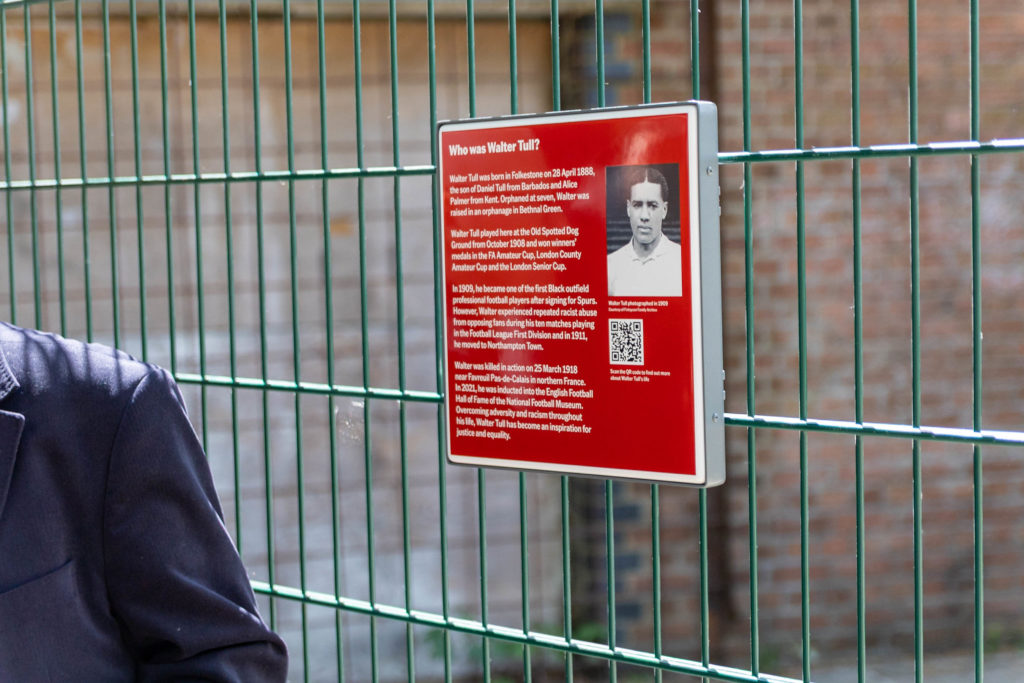Walter Tull’s story is one of extraordinary courage, resilience, and pioneering achievements in the face of racial and societal challenges. Born on 28 April 1888 in Folkestone, Kent, Tull’s life was marked by early hardship. Orphaned by age nine after the deaths of his mother, Alice, and his father, Daniel, Tull and his brother Edward were sent to a Methodist orphanage in London. These formative years of adversity forged Tull’s resilience, which would later define his trailblazing careers in both football and the military.
A Football Pioneer
Tull’s football journey began playing for an amateur club based in East London, playing at the Old Spotted Dog Ground, Tull quickly made a name for himself, helping the team win several amateur trophies, including the London Senior Cup and the FA Amateur Cup. His skill on the field did not go unnoticed, and soon he was signed by Tottenham Hotspur, one of the top clubs in English football at the time.
At Tottenham, Tull faced considerable racial abuse from fans, but his talent and professionalism shone through. Despite the prejudice he endured, Tull consistently demonstrated his integrity both on and off the field. After a brief stint with Spurs, he transferred to Northampton Town in 1911, where he flourished under manager Herbert Chapman. His time at Northampton Town further cemented his status as one of the first black professional footballers in the United Kingdom.
Military Service and Heroism
When World War I erupted in 1914, Tull enlisted in the British Army, joining the 17th (1st Football) Battalion of the Middlesex Regiment, a unit composed of professional footballers. His military career was as groundbreaking as his football career. Tull quickly rose through the ranks to become a sergeant and saw action on the Western Front, including the Battle of the Somme.
Tull’s most remarkable achievement came in May 1917 when he became one of the first black officers in the British Army, commanding white British troops—a direct challenge to military regulations of the time that restricted officer status to men of “pure European descent.” His leadership and bravery on the battlefield were widely recognized, especially during his service on the Italian front, where he was mentioned in dispatches for his “gallantry and coolness” under fire.
The Ultimate Sacrifice
Walter Tull’s life was tragically cut short during the Spring Offensive on 25 March 1918, near the village of Favreuil in France. He was just shy of his 30th birthday. Tull’s body was never recovered, but his name is inscribed on the Arras Memorial, a testament to his service and sacrifice. His death was a profound loss, but his groundbreaking achievements in football and the military left an enduring legacy.
A Lasting Legacy
Walter Tull’s story is a symbol of the fight for racial equality in Britain. His achievements on the football field and in the military broke down barriers and challenged the deeply entrenched prejudices of early 20th-century Britain. Today, Tull is honored through memorials, including a statue at Northampton Town’s Sixfields Stadium, and a road named after him in Northampton. His story is also an integral part of the British educational curriculum, teaching future generations about the importance of resilience, equality, and perseverance.
Walter Tull’s legacy, from the football grounds here at the OSD and Tottenham Hotspur to the battlefields of France, is an enduring reminder of the power of dignity and determination. His life continues to inspire, serving as a beacon of hope for a more inclusive and equitable world.

